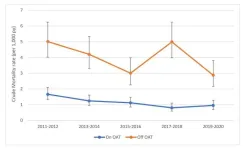(Press-News.org) A team of leading sleep researchers from the British Sleep Society have called for the government to abolish the twice-yearly clock changes in the UK due to the adverse effects on sleep and circadian health.
After considering the available scientific evidence that circadian and sleep health are positively affected by the availability of natural daylight during the morning and negatively affected by the twice-yearly changes of clock time, especially when the clocks move forward in spring, the British Sleep Society recommends the abolition of the twice-yearly clock changes in the UK.
With sleep being central to health and wellbeing, the Society has issued a statement saying that it “strongly recommends” for Standard Time – also known as Greenwich Mean Time (GMT) – to run throughout the year.
The statement, which is published in the Journal of Sleep Research today (Wednesday 23 October), is co-authored by academics from across the UK, led by Dr Megan Crawford of the University of Strathcylde, Dr Eva Winnebeck of the University of Surrey, and Professor Malcolm von Schantz of Northumbria University.
The Society has published its statement to coincide with the clocks changing to Standard Time this weekend, an arrangement which began in 1972 with the British Summer Time Act.
Evidence reviewed by the Society shows the changes of clock time to Daylight Saving Time (DST) in late March, more widely known as British Summer Time (BST), can interfere negatively with sleep regulation.
Malcolm von Schantz, Professor of Chronobiology at Northumbria University and a member of the Northumbria Centre for Sleep Research, said: “There is an ongoing debate in the UK and in other countries about whether twice-yearly changes into and out of Daylight Saving Time should be abolished.
“Standard Time aligns closely with the natural light-dark cycles of the day and night. In calling for Standard Time to run year-long, the Society emphasises that natural daylight in the morning is crucial for maintaining an optimal alignment of our body clocks with day and night, which is essential for optimal sleep and overall health.”
Professor von Schantz added: “Restoring permanent Standard Time would mean our clocks would be closely aligned to solar time, and while it would mean earlier sunsets in the summer, there would be additional benefits to health from improved sleep and circadian alignment due to increased exposure to morning sunlight from autumn to spring.”
Dr Eva Winnebeck, Lecturer in Chronobiology at the University of Surrey, explains: “What we often don’t realise is that Daylight Saving Time changes our schedules, moving them forward by one hour while daylight remains the same. DST forces us all to get up and go to work or school one hour earlier. In seasons with fewer daylight hours such as now in autumn, it means most of us have to get up and commute in the dark.”
Members of the British Sleep Society assessed the unique geographical context and orientation of the UK in their decision making. Noting that almost the entire UK is located to the west of the Prime Meridian which passes through the Royal Observatory at Greenwich, most of the country experiences later sunrises and later sunsets all year round.
The Society also noted that if the UK considers changes to the current time zone arrangements, then the discussion and decision should be taken in partnership with the Republic of Ireland to avoid a time zone border across the island.
“Discussions around abolishing the twice-yearly clock change keep emerging, alarmingly some want to replace it with Daylight Saving Time all year round” says Dr Megan Crawford, Senior Lecturer in Psychology at the University of Strathclyde.
“We consider this a misguided idea from a sleep and circadian health perspective. Mornings are the time when our body clocks have the greatest need for light to stay in synch. At our latitudes there is simply no spare daylight to save during the winter months and given the choice between natural light in the morning and natural light in the afternoon, the scientific evidence favours light in the morning.”
She added: “Other sleep societies have argued against this and the return to all year-round Standard Time, but there is currently no published UK perspective. The unique location and orientation of our UK landmass needs to be considered because permanent DST would over-disadvantage people west and north of London.”
The full position statement from the British Sleep Society, titled DST in the UK, is available to view in the Journal of Sleep Research. It is supported by several organizations, including The Irish Sleep Society, British Paediatric Sleep Society, Capella (Sleep Action), The Sleep Charity, and The British Society of Pharmacy Sleep Services.
Experts in the Northumbria Centre for Sleep Research study and treat disorders of sleep and wakefulness, examining how biological, psychological, social and environmental circumstances affect sleep, as well as assessing, diagnosing and treating sleep disorders. Many studies are carried out within the Centre’s purpose-built two-bedroom en suite facility which has a fully integrated kitchen and laboratory control room.
END
Sleep experts call for UK to abolish twice-yearly clock changes
A team of leading sleep researchers from the British Sleep Society have called for the government to abolish the twice-yearly clock changes in the UK due to the adverse effects on sleep and circadian health.
2024-10-23
ELSE PRESS RELEASES FROM THIS DATE:
Risk of cardiovascular disease linked to long-term exposure to arsenic in community water supplies
2024-10-23
Long term exposure to arsenic in water may increase cardiovascular disease and especially heart disease risk even at exposure levels below the federal regulatory limit (10µg/L) according to a new study at Columbia University Mailman School of Public Health. This is the first study to describe exposure-response relationships at concentrations below the current regulatory limit and substantiates that prolonged exposure to arsenic in water contributes to the development of ischemic heart disease.
The researchers ...
Taking the “vibrational fingerprints” of molecules got 100 times faster
2024-10-23
Researchers Takuma Nakamura, Kazuki Hashimoto, and Takuro Ideguchi of the Institute for Photon Science and Technology at the University of Tokyo have increased by a 100-fold the measurement rate of Raman spectroscopy, a common technique for measuring the “vibrational fingerprint” of molecules in order to identify them. As the measurement rate has been a major limiting factor, this improvement contributes to advancements in many fields that rely on identifying molecules and cells, such as biomedical diagnostics and material analytics. The findings were published in the journal Ultrafast ...
Gardens prevent pollinators from starving when farmland nectar is scarce, new study finds
2024-10-23
Gardens offer a steady and reliable source of nectar all year round, helping to keep pollinators fed when farmland sources are limited, researchers have discovered.
This consistency means that even small patches of gardens in rural areas can sustain pollinators, particularly in early spring and late summer when nectar is scarce.
In the findings, published today in Proceedings of the Royal Society B, scientists at the University of Bristol discovered that gardens can provide between 50% and 95% of the total nectar during these critical ...
Addiction treatment decreases suicide risk among people with opioid dependence
2024-10-23
Treating opioid use disorder significantly lowers the very high rate (8 times the general population) of suicide among people with opioid dependence.
A Scottish study led by Glasgow Caledonian University of over 45,000 patients receiving methadone or buprenorphine for opioid use disorder reported this important result today in the scientific journal Addiction.
There were 575 suicides among the group of 46,453 people with opioid use disorder, accounting for 1.2% of the group. Although every member of the group received an OAT prescription at some point between 2011 and 2020, some ...
Abundant urban green space linked to lower rates of heat related illness and death
2024-10-22
Abundant green space in urban areas is linked to lower rates of heat related illness and death as well as better mental health and wellbeing, finds a systematic review of the available research, published in the open access journal BMJ Open.
Green space may help offset the adverse health effects of high temperatures, conclude the researchers.
In recognition of the detrimental heat related effects of increasing urbanisation and climate change, one of the UN Sustainable Development Goal targets stipulates the ...
Lifetime sudden cardiac death risk 4+ times higher for those with schizophrenia
2024-10-22
The lifetime risk of an unexpected and sudden death from a cardiovascular cause in the absence of pre-existing heart disease—known as sudden cardiac death—is more than 4 times higher for people with schizophrenia than it is for the general population, indicates Danish research published online in the journal Heart.
The risk is still around twice as high for those with other types of mental ill health, such as depression, whatever their age, indicate the findings, which suggest that an 18 year old can expect to live around 10 fewer years than someone of the same age without mental health issues.
The research to date indicates ...
Scurvy may be re-emerging amid cost of living crisis and rise of weight loss surgery
2024-10-22
The scourge of scurvy, which is caused by vitamin C deficiency, may be re-emerging amid the cost of living crisis and the rise in weight loss (bariatric) surgery, suggest doctors in the journal BMJ Case Reports after treating a middle-aged man with the condition.
Scurvy is eminently treatable, but because it’s a disease of the past, first associated with sailors during the Renaissance era, it may be mistaken for other conditions, especially inflamed blood vessels (vasculitis), potentially risking fatal bleeding if left untreated, highlight the authors.
Signs can appear as early as a month after a daily intake ...
Ethical framework aims to counter risks of geoengineering research
2024-10-22
WASHINGTON — As interest grows in geoengineering as a strategy for tackling global warming, the world’s largest association of Earth and space scientists today launched an ethical framework as a guide to responsible decision-making and inclusive dialogue.
The report, facilitated by the American Geophysical Union (AGU) and advised by a global panel of experts, says any research into large-scale interventions in Earth’s climate system must be grounded in sound ethical principles so society can make informed choices about whether to deploy them. It warns that the unintended consequences ...
New AI tool set to be a “game changer” in improving outcome predictions for kidney transplant patients
2024-10-22
A new advanced artificial intelligence (AI) tool, developed by renal doctors internationally, represents a significant step forward in predicting and potentially improving outcomes for UK kidney transplant patients.
For patients with late-stage renal failure, a kidney transplant can be life-changing, offering the promise of improved survival and a better quality of life compared to other treatment options. But in the UK alone, around 5,000 people are on the waiting list for a kidney transplant, ...
New VUMC hospital expansion to be named Jim Ayers Tower
2024-10-22
Vanderbilt University Medical Center will name the new expansion tower for Vanderbilt University Hospital the Jim Ayers Tower in recognition of Janet and Jim Ayers’ philanthropic legacy and abiding interest in improving the health care and quality of life for Tennesseans.
The naming of the 15-level, 470,000-square-foot tower, currently under construction between 21st Avenue South and Medical Center Drive on the Main Campus in Nashville, honors the couple’s steadfast community leadership and longtime connection to VUMC. The tower is scheduled to ...
LAST 30 PRESS RELEASES:
New knowledge on heritability paves the way for better treatment of people with chronic inflammatory bowel disease
Under the Lens: Microbiologists Nicola Holden and Gil Domingue weigh in on the raw milk debate
Science reveals why you can’t resist a snack – even when you’re full
Kidney cancer study finds belzutifan plus pembrolizumab post-surgery helps patients at high risk for relapse stay cancer-free longer
Alkali cation effects in electrochemical carbon dioxide reduction
Test platforms for charging wireless cars now fit on a bench
$3 million NIH grant funds national study of Medicare Advantage’s benefit expansion into social supports
Amplified Sciences achieves CAP accreditation for cutting-edge diagnostic lab
Fred Hutch announces 12 recipients of the annual Harold M. Weintraub Graduate Student Award
Native forest litter helps rebuild soil life in post-mining landscapes
Mountain soils in arid regions may emit more greenhouse gas as climate shifts, new study finds
Pairing biochar with other soil amendments could unlock stronger gains in soil health
Why do we get a skip in our step when we’re happy? Thank dopamine
UC Irvine scientists uncover cellular mechanism behind muscle repair
Platform to map living brain noninvasively takes next big step
Stress-testing the Cascadia Subduction Zone reveals variability that could impact how earthquakes spread
We may be underestimating the true carbon cost of northern wildfires
Blood test predicts which bladder cancer patients may safely skip surgery
Kennesaw State's Vijay Anand honored as National Academy of Inventors Senior Member
Recovery from whaling reveals the role of age in Humpback reproduction
Can the canny tick help prevent disease like MS and cancer?
Newcomer children show lower rates of emergency department use for non‑urgent conditions, study finds
Cognitive and neuropsychiatric function in former American football players
From trash to climate tech: rubber gloves find new life as carbon capturers materials
A step towards needed treatments for hantaviruses in new molecular map
Boys are more motivated, while girls are more compassionate?
Study identifies opposing roles for IL6 and IL6R in long-term mortality
AI accurately spots medical disorder from privacy-conscious hand images
Transient Pauli blocking for broadband ultrafast optical switching
Political polarization can spur CO2 emissions, stymie climate action
[Press-News.org] Sleep experts call for UK to abolish twice-yearly clock changesA team of leading sleep researchers from the British Sleep Society have called for the government to abolish the twice-yearly clock changes in the UK due to the adverse effects on sleep and circadian health.



